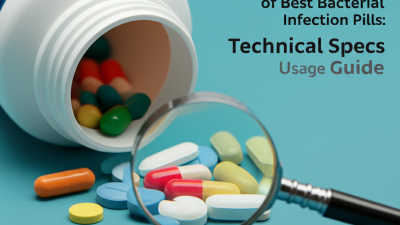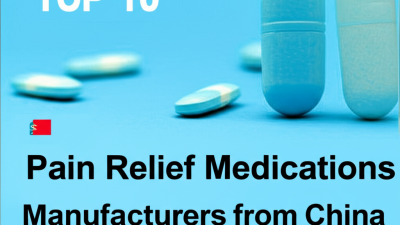Understanding Antibiotics: How They Work and Why We Must Use Them Wisely
The global landscape of healthcare is continually affected by the use of Antibiotics Drugs, which play a crucial role in combating bacterial infections. According to the World Health Organization (WHO), over 700,000 deaths each year are attributed to drug-resistant infections, a grim statistic that underscores the urgent need for prudent antibiotic use. A report by the Centers for Disease Control and Prevention (CDC) estimates that at least 30% of antibiotic prescriptions in the United States are unnecessary, emphasizing a critical gap in effective antibiotic stewardship. As the efficacy of these vital medications diminishes due to overuse and misuse, understanding how antibiotics work becomes paramount. By utilizing these drugs wisely and in accordance with scientific guidelines, we can safeguard their effectiveness for future generations and combat the rising tide of antibiotic resistance.

How Antibiotics Function: A Deep Dive into Mechanisms of Action
Antibiotics are powerful medications that combat bacterial infections by targeting specific components essential to bacterial survival and reproduction. Understanding their mechanisms of action is crucial for appreciating their role in healthcare. The primary ways antibiotics function include inhibiting cell wall synthesis, disrupting protein synthesis, and interfering with nucleic acid metabolism. For instance, penicillins and cephalosporins prevent bacteria from forming a protective cell wall, leading to cell lysis and death. This mechanism is especially effective against rapidly dividing bacteria.
Another critical action of antibiotics involves disrupting protein synthesis. Drugs like tetracyclines and macrolides bind to bacterial ribosomes, hindering the production of essential proteins that bacteria need for growth and replication. Additionally, some antibiotics interfere with bacterial DNA replication and RNA transcription, ultimately stifling bacterial multiplication. Understanding these mechanisms not only highlights their effectiveness but also underscores the importance of using them judiciously to prevent the emergence of antibiotic resistance, a growing concern in modern medicine.
The Importance of Selecting the Right Antibiotic for Specific Infections
 Selecting the right antibiotic for specific infections is crucial for effective treatment and mitigating the risks of antibiotic resistance. Different bacteria respond to various antibiotics, and using the appropriate one can lead to quicker recovery and fewer complications. Misuse or overuse of antibiotics can contribute to the development of resistant strains, making infections harder to treat and increasing healthcare costs.
Selecting the right antibiotic for specific infections is crucial for effective treatment and mitigating the risks of antibiotic resistance. Different bacteria respond to various antibiotics, and using the appropriate one can lead to quicker recovery and fewer complications. Misuse or overuse of antibiotics can contribute to the development of resistant strains, making infections harder to treat and increasing healthcare costs.
Tips for selecting the right antibiotic include getting a proper diagnosis from a healthcare professional. It's essential to identify whether the infection is bacterial or viral since antibiotics are ineffective against viruses. Another tip is to use culture and sensitivity tests when necessary, as these can help determine which antibiotic will be most effective for the specific bacteria causing the infection.
Additionally, always follow your healthcare provider’s recommendations regarding dosage and duration of the antibiotic course. Skipping doses or stopping treatment early can allow bacteria to survive and potentially develop resistance. By understanding the importance of appropriate antibiotic selection, we can protect our health and preserve these vital medications for future generations.
Understanding Antibiotic Resistance: Causes and Implications
Antibiotic resistance is a pressing global health concern arising from the misuse and overuse of antibiotics. Recent studies highlight how, over two decades, the continued use of these medications has not only failed to eliminate superbugs but may have exacerbated the problem. The dynamic between antibiotics and resistant bacteria resembles a cat-and-mouse game, leading scientists to explore various mechanisms that bacteria employ to survive. For instance, they can delay growth, acquire genetic resistance, or even employ self-sacrifice strategies.
Tips: To help combat antibiotic resistance, it’s crucial to use antibiotics only when necessary and follow prescribed guidelines strictly. Informing patients about the risks associated with antibiotic misuse is key. Additionally, supporting research into alternative treatments and new antibiotics will be vital in our ongoing battle against these resilient organisms.
New research also suggests that while antibiotics effectively tackle infections such as typhoid, they can disrupt beneficial gut microbiota, which play an essential role in immune regulation. This highlights the need for a balanced approach when considering antibiotic treatment. Understanding the delicate ecosystem of gut bacteria can empower individuals to make educated choices about their health, ultimately contributing to the fight against antibiotic resistance.
Best Practices for Responsible Antibiotic Use: Dos and Don'ts
Antimicrobial resistance (AMR) poses a significant threat to global health, stemming from the overuse and misuse of antibiotics in both human medicine and agriculture. As the agricultural sector accounts for a large percentage of antibiotic consumption—estimated at 70% in the 2010s—responsible use of these medications is crucial for maintaining their effectiveness. It is imperative for healthcare professionals, farmers, and pet owners alike to adopt best practices in antibiotic stewardship to combat this growing issue.

Tips for Responsible Antibiotic Use:
Do educate yourself and others about when antibiotics are genuinely necessary. Antibiotics are ineffective against viral infections, so it's important to refrain from unnecessary prescriptions.
Don't ignore the role of proper hygiene and vaccination. Preventive measures can reduce the need for antibiotics by minimizing the spread of infections.
Do advocate for and participate in stewardship programs at healthcare facilities. These initiatives are designed to promote the responsible use of antibiotics, improving patient outcomes and curbing AMR.
By following these guidelines, we can all contribute to mitigating the threat of antibiotic resistance and preserving the efficacy of these vital medications for future generations.
When to Seek Medical Advice: Recognizing the Need for Antibiotics
When considering the use of antibiotics, it's crucial to recognize when medical advice is necessary. According to the Centers for Disease Control and Prevention (CDC), more than 30% of antibiotic prescriptions in outpatient settings are unnecessary. This overprescription can lead to antibiotic resistance, a growing public health threat that results in approximately 35,000 deaths annually in the United States alone. Understanding the symptoms that require medical evaluation is essential for effective treatment and can prevent the misuse of antibiotics.
Individuals should seek medical advice in cases where symptoms persist beyond the typical duration of viral infections, such as a cold or flu. If symptoms include a high fever lasting more than three days, difficulty breathing, or severe pain, it may indicate a bacterial infection that could justify antibiotic therapy. The World Health Organization (WHO) emphasizes that timely and appropriate medical intervention can significantly reduce the risk of complications associated with untreated infections. By educating ourselves on these critical indicators and using antibiotics wisely, we can help combat the rise of resistant bacteria and preserve the effectiveness of these vital medications.
Understanding Antibiotics: How They Work and Why We Must Use Them Wisely
| Dimension | Data |
|---|---|
| Types of Antibiotics | Penicillin, Cephalosporins, Tetracyclines, Macrolides |
| Common Infections Treated | Strep throat, Urinary tract infections, Pneumonia, Skin infections |
| Side Effects | Nausea, Diarrhea, Allergic reactions, Yeast infections |
| When to Seek Medical Advice | Severe symptoms, Persistent illness, High fever, Breathing difficulties |
| Importance of Responsible Use | Prevent antibiotic resistance, Ensure effectiveness, Avoid unnecessary side effects |
Related Posts
-

Emerging Trends in Pharmaceutical Technology: The Evolution of Best Antibiotics Drugs by 2025
-

The Ultimate Guide to Sourcing the Best Antibiotic Medicine for Global Markets
-

Comparing Top Antibiotic Medicines for Effective Treatment Options
-

Ultimate Guide to Choosing the Right Bacterial Infection Pills for Fast Recovery
-

Unlocking the Benefits of Best Bacterial Infection Pills: Technical Specs and Usage Guide
-

Top 10 Pain Relief Medications Manufacturers from China at the 137th Canton Fair
